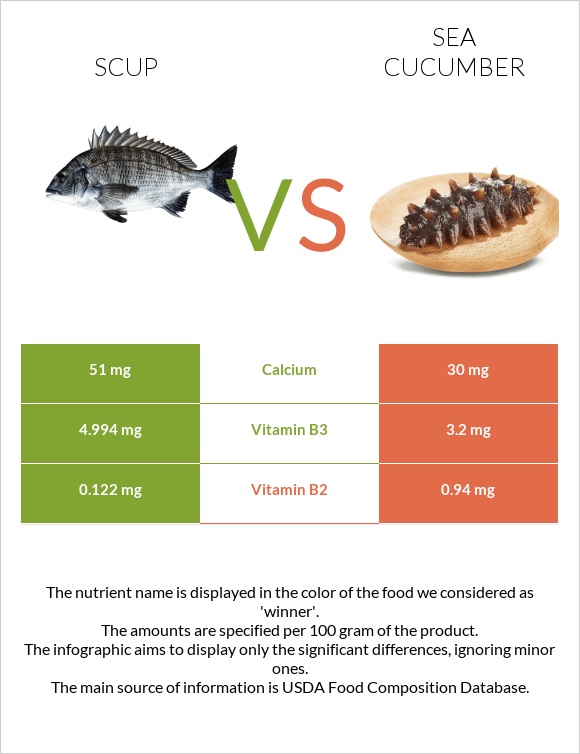Scup vs. Sea cucumber — In-Depth Nutrition Comparison
Compare
Summary of differences between scup and sea cucumber
- Scup has more vitamin B3 and vitamin B1, while sea cucumber has more vitamin B2.
- Sea cucumber covers your daily need for vitamin B2, 63% more than scup.
- Scup contains 3 times more vitamin B1 than sea cucumber. While scup contains 0.127mg of vitamin B1, sea cucumber contains only 0.05mg.
These are the specific foods used in this comparison Fish, scup, cooked, dry heat and Sea cucumber, yane (Alaska Native).
Infographic

Infographic link
Mineral Comparison
Mineral comparison score is based on the number of minerals by which one or the other food is richer. The "coverage" charts below show how much of the daily needs can be covered by 300 grams of the food.
| Contains more MagnesiumMagnesium | +∞% |
| Contains more CalciumCalcium | +70% |
| Contains more PotassiumPotassium | +∞% |
| Contains more IronIron | +13.3% |
| Contains more CopperCopper | +∞% |
| Contains more ZincZinc | +∞% |
| Contains more PhosphorusPhosphorus | +∞% |
| Contains more ManganeseManganese | +∞% |
| Contains more SeleniumSelenium | +∞% |
Vitamin Comparison
Vitamin comparison score is based on the number of vitamins by which one or the other food is richer. The "coverage" charts below show how much of the daily needs can be covered by 300 grams of the food.
| Contains more Vitamin AVitamin A | +∞% |
| Contains more Vitamin B1Vitamin B1 | +154% |
| Contains more Vitamin B3Vitamin B3 | +56.1% |
| Contains more Vitamin B5Vitamin B5 | +∞% |
| Contains more Vitamin B6Vitamin B6 | +∞% |
| Contains more Vitamin B12Vitamin B12 | +∞% |
| Contains more FolateFolate | +∞% |
| Contains more Vitamin B2Vitamin B2 | +670.5% |
All nutrients comparison - raw data values
| Nutrient |  |
 |
DV% diff. |
| Selenium | 46.8µg | 85% | |
| Vitamin B12 | 1.62µg | 68% | |
| Vitamin B2 | 0.122mg | 0.94mg | 63% |
| Phosphorus | 237mg | 34% | |
| Vitamin B6 | 0.346mg | 27% | |
| Protein | 24.21g | 13g | 22% |
| Cholesterol | 67mg | 22% | |
| Vitamin B5 | 0.865mg | 17% | |
| Potassium | 368mg | 11% | |
| Vitamin B3 | 4.994mg | 3.2mg | 11% |
| Magnesium | 29mg | 7% | |
| Copper | 0.065mg | 7% | |
| Zinc | 0.62mg | 6% | |
| Vitamin B1 | 0.127mg | 0.05mg | 6% |
| Fats | 3.5g | 0.4g | 5% |
| Calories | 135kcal | 56kcal | 4% |
| Folate | 17µg | 4% | |
| Vitamin A | 31µg | 3% | |
| Calcium | 51mg | 30mg | 2% |
| Sodium | 54mg | 2% | |
| Manganese | 0.045mg | 2% | |
| Iron | 0.68mg | 0.6mg | 1% |
| Tryptophan | 0.271mg | 0% | |
| Threonine | 1.061mg | 0% | |
| Isoleucine | 1.115mg | 0% | |
| Leucine | 1.967mg | 0% | |
| Lysine | 2.223mg | 0% | |
| Methionine | 0.716mg | 0% | |
| Phenylalanine | 0.945mg | 0% | |
| Valine | 1.247mg | 0% | |
| Histidine | 0.713mg | 0% |
Macronutrient Comparison
Macronutrient breakdown side-by-side comparison
Protein:
24.21 g
Fats:
3.5 g
Carbs:
0 g
Water:
68.42 g
Other:
3.87 g
Protein:
13 g
Fats:
0.4 g
Carbs:
0 g
Water:
80.7 g
Other:
5.9 g
| Contains more ProteinProtein | +86.2% |
| Contains more FatsFats | +775% |
| Contains more WaterWater | +17.9% |
| Contains more OtherOther | +52.5% |
~equal in
Carbs
~0g





